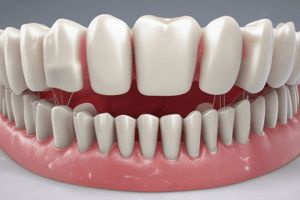Podcast
Questions and Answers
What does etiology of disease deal with?
What does etiology of disease deal with?
- Factors promoting health
- Factors related to disease treatment
- Factors causing disease spread
- Factors involved in disease onset (correct)
Which term best describes 'noxae' in the context of etiology of disease?
Which term best describes 'noxae' in the context of etiology of disease?
- Symptoms
- Prevention
- Causes (correct)
- Treatment
What is the opposite of the etiology of disease?
What is the opposite of the etiology of disease?
- Pharmacology
- Etiology of health (correct)
- Epidemiology
- Pathophysiology
What is the focus of pathogenesis?
What is the focus of pathogenesis?
What aspect does the etiology of health primarily deal with?
What aspect does the etiology of health primarily deal with?
In the context of disease onset, what does 'genesis' refer to?
In the context of disease onset, what does 'genesis' refer to?
What term best describes the role of 'noxae' in the context of disease etiology?
What term best describes the role of 'noxae' in the context of disease etiology?
What is the focus of thanatogenesis?
What is the focus of thanatogenesis?
What does sanogenesis primarily deal with?
What does sanogenesis primarily deal with?
What aspect of disease does semiology primarily deal with?
What aspect of disease does semiology primarily deal with?
Flashcards are hidden until you start studying
Study Notes
Etiology of Disease
- Etiology concerns the study of the causes and contributing factors of diseases.
- It investigates how specific agents or conditions lead to health issues.
Noxae
- 'Noxae' refers to harmful agents or factors that contribute to disease development.
- These can be biological, chemical, or physical in nature.
Opposite of Etiology
- The opposite of etiology is often considered to be pathogenesis, which focuses on the progression and mechanisms of disease after the cause has been established.
Pathogenesis
- Pathogenesis centers on the biological mechanisms through which disease develops and progresses in the body.
- It examines the sequence of events from the initial cause to the final manifestations of disease.
Etiology of Health
- Etiology of health addresses the factors that promote well-being and prevent disease.
- It studies the positive influences and protective factors for maintaining health.
Genesis in Disease Onset
- In the context of disease onset, 'genesis' refers to the origins or beginning of a disease process.
- It encompasses the initial triggers and conditions that lead to disease development.
Role of Noxae in Disease Etiology
- Noxae plays a critical role in causing diseases, representing the harmful factors that lead to pathology.
- Understanding noxae is essential for identifying risk factors and preventive measures.
Thanatogenesis
- Thanatogenesis focuses on the processes leading to death, particularly in relation to disease.
- It examines how diseases contribute to mortality and the underlying biological mechanisms.
Sanogenesis
- Sanogenesis deals with the processes and factors that contribute to healing and recovery from diseases.
- It emphasizes the body's natural defenses and restorative mechanisms.
Semiology
- Semiological study is concerned with the signs and symptoms of diseases.
- It helps in diagnosing diseases by examining observable indicators of health conditions.
Studying That Suits You
Use AI to generate personalized quizzes and flashcards to suit your learning preferences.




